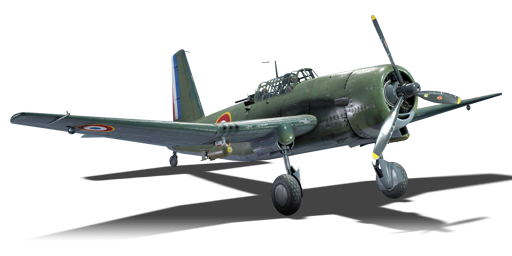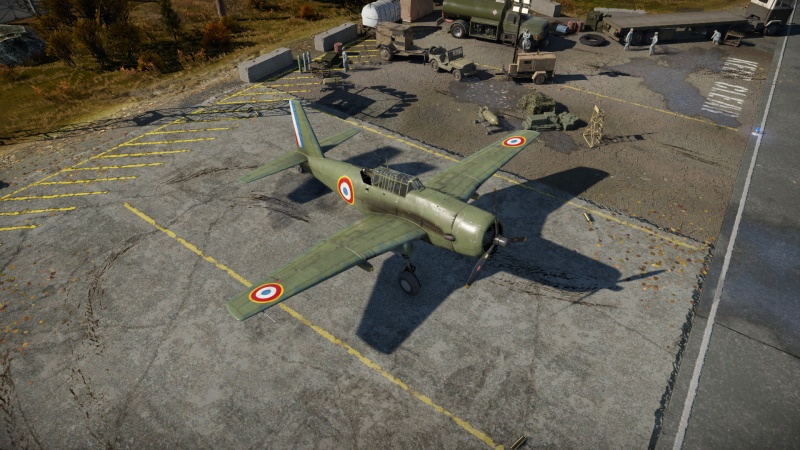Difference between revisions of "A-35B (France)"
(→Usage in battles: Edits) |
m (→External links) |
||
| Line 203: | Line 203: | ||
* [[wt:en/news/5123-development-a-35b-the-american-legionnaire-en|[Devblog] A-35B: The American Legionnaire]] | * [[wt:en/news/5123-development-a-35b-the-american-legionnaire-en|[Devblog] A-35B: The American Legionnaire]] | ||
| + | * [https://forum.warthunder.com/index.php?/topic/385964-vultee-a-35b/ Official data sheet - more details about the performance] | ||
{{Template:AirManufacturer Vultee}} | {{Template:AirManufacturer Vultee}} | ||
{{France bombers}} | {{France bombers}} | ||
Revision as of 08:19, 22 January 2021
Contents
Description
The ▄A-35B is a rank II French dive bomber with a battle rating of 3.0 (AB), 2.7 (RB), and 3.3 (SB). It was introduced in Update 1.73 "Vive la France".
General info
Flight performance
| Characteristics | Max Speed (km/h at 3,650 m) |
Max altitude (meters) |
Turn time (seconds) |
Rate of climb (meters/second) |
Take-off run (meters) | |||
|---|---|---|---|---|---|---|---|---|
| AB | RB | AB | RB | AB | RB | |||
| Stock | 466 | 448 | 7100 | 30.6 | 33.4 | 5.2 | 5.2 | 307 |
| Upgraded | 507 | 485 | 27.8 | 29.0 | 10.3 | 7.5 | ||
Details
| Features | |||||
|---|---|---|---|---|---|
| Combat flaps | Take-off flaps | Landing flaps | Air brakes | Arrestor gear | |
| ✓ | ✓ | ✓ | ✓ | X | |
| Limits | ||||||
|---|---|---|---|---|---|---|
| Wings (km/h) | Gear (km/h) | Flaps (km/h) | Max Static G | |||
| Combat | Take-off | Landing | + | - | ||
| 0 | 278 | 430 | 290 | 278 | ~13 | ~5 |
| Optimal velocities (km/h) | |||
|---|---|---|---|
| Ailerons | Rudder | Elevators | Radiator |
| < 257 | < 350 | < 380 | > 320 |
| Compressor | Optimal altitude | 100% Engine power | WEP Engine power |
|---|---|---|---|
| Setting 1 | 1,676 m | 1,500 hp | 1,672 hp |
| Setting 2 | 4,115 m | 1,350 hp | 1,430 hp |
Survivability and armour
- 38 mm Bulletproof glass in front of pilot.
- 12.7 mm Steel plate behind the pilot.
- 6.35 mm Steel plate behind oil cooling system.
- 12.7 mm Steel plate in front of dorsal gunner.
Modifications and economy
Armaments
Offensive armament
The A-35B (France) is armed with:
- 6 x 12.7 mm M2 Browning machine guns, wing-mounted (375 rpg = 2,250 total)
The six machine guns are arranged in bundles of two mounted in each wing. Each is armed with the same amount of ammunition, which means that all guns will fire together until empty.
Suspended armament
The A-35B (France) can be outfitted with the following ordnance:
- 2 x 500 lb AN-M64A1 bombs + 2 x 250 lb AN-M57 bombs (1,500 lb total)
- 4 x 500 lb AN-M64A1 bombs (2,000 lb total)
- 1 x 1,000 lb AN-M65A1 bomb (1,000 lb total)
Defensive armament
The A-35B (France) is defended by:
- 1 x 12.7 mm M2 Browning machine gun, dorsal turret (400 rpg)
Usage in battles
The A-35B is designed as a ground attack aircraft, and should be played as such. The aircraft is relatively slow, rather large, and not particularly manoeuvrable. Thus, play the aircraft like a ground attacker. However, it does have some perks which should be utilized to the maximum.
Air Battles:
The A-35 has a nominal bomb load of up to 2,000 lbs split over four 500 lb bombs. This isn't the greatest bomb load by any means, but can get the job done against lighter targets. The 500 lb bombs don't have a particularly large blast radius, which make it difficult to destroy harder targets such as tanks and pillboxes. However, the aircraft has dive brakes, meaning that it is capable of pinpoint dive-bombing against the enemy. When at a decent altitude (1,500-2,000 metres above the target), drop into a near vertical dive, deploy airbrakes, and put the target slightly above the cockpit. Then, at ~500 metres above the target, drop the bomb(s) and pull out. If this is done accurately, it can ensure a direct hit or kill against ground targets. The 1,000 lb bomb is usually more suited for this bombing role, since it has a larger blast radius. However, the downside of the larger bomb is that you only have a single bomb, and a single drop.
The second advantage the A-35 has for air battles are its six heavy 12.7 mm M2 Browning machine guns. While the A-35 doesn't get access to the later, more powerful M2 Brownings, these machine guns are very suited to ripping ground and air targets apart. Notably, they are quite good at destroying light pillboxes. Against pillboxes, the universal or stealth belt is usually the most effective, as they contain the most M8 AP-I incendiary tracer bullets which are extremely effective against pillboxes. Note that the pillboxes will be destroyed faster if shot at from the top - in this mode, perform a diving attack (30-40 degrees) on the pillbox, destroy it, and then pull up and strike another target. If the pillbox isn't destroyed, come in for another strafing run, Finally, note that the 12.7 mm guns can only destroy light pillboxes - regular pillboxes are impervious to all gunfire, and can only be destroyed with bombs.
Ground Battles:
The A-35 is also well-suited for ground battles where it can make use of it's payload. Again, the aforementioned dive bombing tactic can be used against enemy tanks, especially clustered vehicles at a capture point, or other choke point. The 1000 lb bomb is almost always the best option against ground targets, as it packs the largest punch. While this may limit the amount of targets you can hit in a single sortie, the chances of getting one or more kills is much greater. Finally, don't underestimate the power of your machine guns! They can penetrate the tops of most tanks at the A-35's BR (the Ground Targets belt is the best, with 26 mm of pen), and can obviously lay waste to any unarmoured SPGs or SPAAs.
Air-to-air and defensive flying:
If being attacked by any fighters, the A-35 gets into a sticky position. Its manoeuvrability and top speed are both abysmal for its BR, making it a sitting duck for any pursuing aircraft. Thus, do not attempt to engage any fighters in a 1-on-1, as it will result in a quick demise. Instead, lead the enemies toward friendly fighters, as well as onto your six o'clock as you have a very potent tail gunner. The tail gunner is armed with another 12.7 mm Browning gun, which is great for pilot snipes and setting engines on fire. Thus, bait them onto your tail, where you can quickly pilot-snipe them and remove the threat. It is worth noting that your six 12.7 mm Brownings are very good at setting things on fire; however, do not engage any other aircraft unless they are noticeably more sluggish than you.
Manual Engine Control
| MEC elements | ||||||
|---|---|---|---|---|---|---|
| Mixer | Pitch | Radiator | Supercharger | Turbocharger | ||
| Oil | Water | Type | ||||
| Controllable | Controllable Auto control available |
Not controllable Not auto controlled |
Controllable Not auto controlled |
Combined | Controllable 2 gears |
Not controllable |
Pros and cons
Pros:
- Gets an airspawn allowing it to reach the battlefield faster
- Has dive brakes which are highly useful for dive-bombing
- Has a decent payload for an aircraft of its size
- Heavy forward armament of six 12.7 mm machine guns, as well as an additional 12.7 mm machine gun in the rear
Cons:
- Large and slow - fighters will have no trouble catching up!
- Payload is constrained to 500 lb bombs if carrying max bomb load, and no bombs over 1,000 lbs are available
- Manoeuvrability, especially roll rate, is absolutely horrid compared to fighters and even some other attackers
History
At the beginning of the 1930s, the American company Vultee was developing a concept for a strike aircraft capable of effectively hitting ground targets, light vehicles and enemy infantry from low altitudes. Effective actions by Germany’s Ju-87 dive bombers in Europe served as a basis for the creation of a concept for the American A-31 Vengeance, a strike dive bomber with a machine gun battery in its wings. This new addition immediately caught the attention of the British delegation, which happened to be searching for a design like the Stuka to aid in the fight against Germany. In the course of modernization, the A-31 received a new 1700 hp engine and strengthened armament of five, and then seven high-caliber Browning machine guns (six in the wings and one more for defense against attacks from the rear), and a bomb load of up to 2000 pounds. Modernized version got new designation - Vultee A-35. In spite of a large export order, the Vengeance also served in the American air force and navy, and the reviews about it were contradictory. For the war in Europe, the bomber turned out to be ill-prepared. Its low speed, large silhouette and need to descend to drop its bombs made it very vulnerable to enemy flak cannons and fighters. However, in the Pacific Theater the vehicle performed well. The Japanese had far fewer anti-aircraft defenses, and the Vengeance served as an attack aircraft, a bomber and a submarine hunter.
Nonetheless, the main operators of the A-35 were foreigners. Several squadrons in the British Air Force were equipped with these dive bombers. The aircraft was delivered to Australia and Brazil, and it served in the Free French Army in Africa.
- From Devblog
Media
See also
Links to the articles on the War Thunder Wiki that you think will be useful for the reader, for example:
- reference to the series of the aircraft;
- links to approximate analogues of other nations and research trees.
External links
| Vultee Aircraft Corporation | |
|---|---|
| Export | P-66 · ▄A-35B · V-11 · V-12D |
| France bombers | |
|---|---|
| Farman | F.222.2 · N.C.223.3 |
| Latécoère | Late 298D |
| Potez | Potez 633 |
| Liore et Olivier | LeO 451 early · LeO 451 late |
| Bloch | M.B.174A-3 · M.B.162 · M.B.175T |
| American | V-156-F · Martin 167-A3 · ▄A-35B · ▄SB2C-5 · B-26C · ▄PBY-5A Late · ▄PB4Y-2 |
| British | Lancaster MR.7 |





